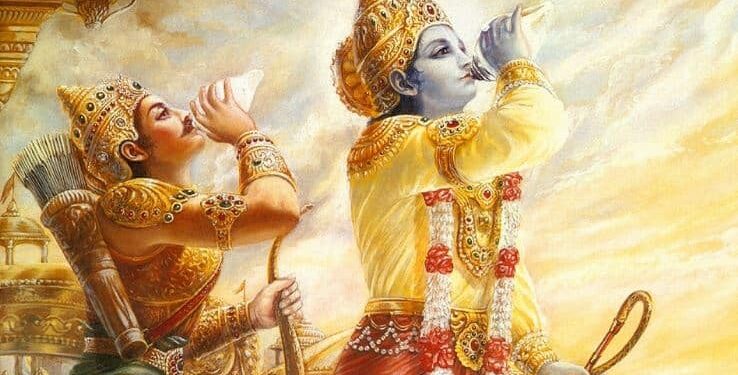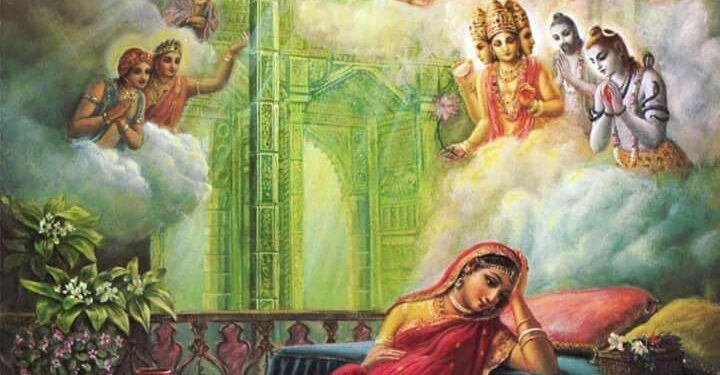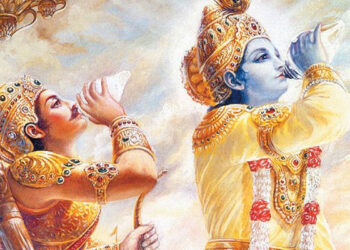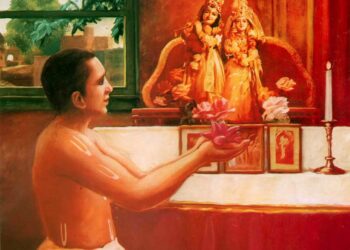TEXT 32
yadṛcchayā copapannaṁ
svarga-dvāram apāvṛtam
sukhinaḥ kṣatriyāḥ pārtha
labhante yuddham īdṛśam
SYNONYMS
yadṛcchayā—by its own accord; ca—also; upapannam—arrived at; svarga—of the heavenly planets; dvāram—door; apāvṛtam—wide open; sukhinaḥ—very happy; kṣatriyāḥ—the members of the royal order; pārtha—O son of Pṛthā; labhante—do achieve; yuddham—war; īdṛśam—like this.
TRANSLATION
O Pārtha, happy are the kṣatriyas to whom such fighting opportunities come unsought, opening for them the doors of the heavenly planets.
PURPORT
As supreme teacher of the world, Lord Kṛṣṇa condemns the attitude of Arjuna, who said, “I do not find any good in this fighting. It will cause perpetual habitation in hell.” Such statements by Arjuna were due to ignorance only. He wanted to become nonviolent in the discharge of his specific duty. For a kṣatriya to be on the battlefield and to become nonviolent is the philosophy of fools. In the Parāśara-smṛti, or religious codes made by Parāśara, the great sage and father of Vyāsadeva, it is stated:
kṣatriyo hi prajā rakṣan
śastra-pāṇiḥ pradaṇḍayan
nirjitya para-sainyādi
kṣitiṁ dharmeṇa pālayet
“The kṣatriya’s duty is to protect the citizens from all kinds of difficulties, and for that reason he has to apply violence in suitable cases for law and order. Therefore he has to conquer the soldiers of inimical kings, and thus, with religious principles, he should rule over the world.”
Considering all aspects, Arjuna had no reason to refrain from fighting. If he should conquer his enemies, he would enjoy the kingdom; and if he should die in the battle, he would be elevated to the heavenly planets, whose doors were wide open to him. Fighting would be for his benefit in either case.
TEXT 33
atha cet tvam imaṁ dharmyaṁ
saṅgrāmaṁ na kariṣyasi
tataḥ sva-dharmaṁ kīrtiṁ ca
hitvā pāpam avāpsyasi
SYNONYMS
atha—therefore; cet—if; tvam—you; imam—this; dharmyam—as a religious duty; saṅgrāmam—fighting; na—do not; kariṣyasi—perform; tataḥ—then; sva-dharmam—your religious duty; kīrtim—reputation; ca—also; hitvā—losing; pāpam—sinful reaction; avāpsyasi—will gain.
TRANSLATION
If, however, you do not perform your religious duty of fighting, then you will certainly incur sins for neglecting your duties and thus lose your reputation as a fighter.
PURPORT
Arjuna was a famous fighter, and he attained fame by fighting many great demigods, including even Lord Śiva. After fighting and defeating Lord Śiva in the dress of a hunter, Arjuna pleased the lord and received as a reward a weapon called pāśupata-astra. Everyone knew that he was a great warrior. Even Droṇācārya gave him benedictions and awarded him the special weapon by which he could kill even his teacher. So he was credited with so many military certificates from many authorities, including his adopted father Indra, the heavenly king. But if he abandoned the battle, not only would he neglect his specific duty as a kṣatriya, but he would lose all his fame and good name and thus prepare his royal road to hell. In other words, he would go to hell not by fighting but by withdrawing from battle.


















